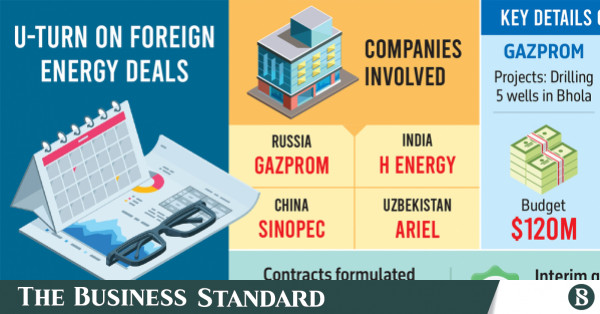Govt won’t sign 4 energy deals cut by AL regime with foreign cos


The interim government is not going to sign gas extraction and supply agreements with four companies which were formulated and nearly finalised under the former Awami League government, according to officials from the Energy and Mineral Resources Division.
The companies involved are India’s H Energy, Russia’s Gazprom, China’s Sinopec, and Uzbekistan’s Ariel.
Officials say the contracts will not be signed since the Quick Energy Supply Act, under which they were being processed, has been repealed by the interim government.
The interim government will review the agreements and proceed with those it considers necessary, they added.
“The contracts will be awarded to interested companies through an open tender process,” Energy Secretary Md Nurul Alam told TBS.
Officials say the Hasina government had assessed the feasibility of contracts with these foreign companies under the Quick Enhancement of Electricity and Energy Supply (Special Provision) Act 2010.
The proposals were reviewed, and potential costs were finalised and preparations to sign the contracts were in progress, according to the officials.
However, before the agreements could be signed, the Hasina government was ousted on 5 August in a student-led mass uprising.
According to Energy Division officials, the agreements with Russia’s Gazprom to drill five gas wells in Bhola, with H Energy to import liquefied natural gas (LNG) via pipeline from India, and with Dipon Gas, a Bangladesh-based company, to build a pipeline from Bhomra to Khulna to supply the imported LNG were nearly finalised.
Additionally, discussions were ongoing with China’s Sinopec to drill five gas wells in Sylhet and with Uzbekistan’s Ariel to drill six wells and perform a workover on another.
Sources say the former AL government initiated plans to drill new wells and carry out workovers on existing wells to boost domestic gas supply. They were negotiating with various local and foreign companies to award contracts without a tender process.
Plans were underway to work on 17 onshore wells with Gazprom, Sinopec, and Ariel, and the Energy Division was in the final stages of approving the proposals after reviewing their financial details, they added.
As per the Energy Division sources, the AL government had planned to boost gas production by drilling and working over 46 wells by 2025. Former State Minister for Power and Energy Nasrul Hamid frequently stated that these wells would increase gas supply to the national grid. As part of this plan, three foreign companies were enlisted to operate 17 of the wells.
Agreements under questions
Gazprom has drilled 20 wells in Bangladesh, including seven in Bhola under the Quick Energy Supply Act. The Russian company is currently drilling four more wells in Bhola under the same act. The Hasina government had planned to award them the contract to drill five additional wells in Bhola using the same approach.
Energy Division officials say the Bangladesh Petroleum Exploration and Production Company Limited (Bapex) has submitted a report to the Energy Division evaluating the technical and economic aspects of Gazprom’s proposal to drill the five wells in Bhola. A meeting was also held at the Ministry of Power, Energy, and Mineral Resources to discuss the proposal.
Of the five wells, one is an exploration well and the remaining four are development wells. Gazprom proposed a budget of $120 million for the project. The Energy Division and Gazprom were negotiating this cost.
The deal with India’s H Energy Limited involved importing 0.8 to 1 MTPA (million tonnes per annum) of LNG to Bangladesh. After nearly four years of discussions, the agreement was in its final stages. The LNG was intended to be supplied to the power plants in Khulna and western regions of the country.
Sources in the Energy Division report that a negotiation meeting of the proposal processing committee was scheduled for 27 July to discuss the Gas Supply Agreement (GSA) with the Indian company. However, the meeting was postponed due to the student-led movement.
An official from Petrobangla, speaking on condition of anonymity, said discussions were ongoing with a company called Dipon Gas to establish a 65 km pipeline from Satkhira to Khulna for importing LNG from India.
Dipon Gas is a Bangladesh-based company with operations in India and Singapore, according to its website. The company has previously worked on installing the pipeline for importing fuel oil from Numaligarh in India and was involved in the construction of Excelerate Energy’s LNG terminal and pipeline at Maheshkhali.
Mohammad Eunus, director (Admin & GS) of Dipon Gas Co Ltd, told TBS, “There is significant demand for gas in the southwestern part of the country. While a gas pipeline has been laid from Bheramara to Khulna, there is currently no gas supply. This has hindered industrialisation in the region, including the establishment of fertiliser factories. The previous government had initiated plans to import gas and supply it to the Khulna division and southwestern districts.”
He added, “As a company with 50 years of experience in high-pressure pipeline installation, Dipon Gas proposed a pipeline from Satkhira to Khulna, which the former government was considering.”
Eunus further mentioned that if the interim government proceeds with the project through tenders, Dipon Gas will participate.
Petrobangla Chairman Zanendra Nath Sarker told TBS on 17 April this year that discussions with India’s H Energy were nearing finalisation.
Discussions were also ongoing with the Chinese company Sinopec regarding the drilling of five wells under Sylhet Gas Fields Company Limited. The wells include Rashidpur-11 and 13, Kailash Tila-9, Dupi Tila-1, and the only development well, Sylhet-11. These projects were estimated to cost around Tk1,200 crore.
Meanwhile, Uzbek company Ariel was in the final stages of negotiations to drill seven wells under Bangladesh Gas Fields Company Limited across various districts. The Energy Division had completed the evaluation of Ariel’s proposal to drill and renovate these wells. The proposal included drilling four new wells and performing workovers on three existing ones, with a proposed cost of $131 million.




